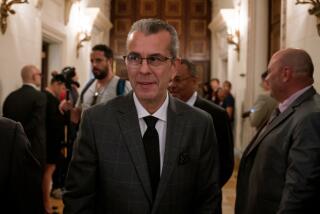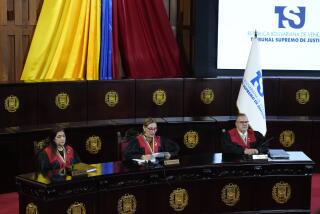Iran’s president says enemies’ ‘soft overthrow’ failed
BEIRUT — Iranian President Mahmoud Ahmadinejad, his controversial reelection affirmed by clerical allies a day earlier, on Tuesday hailed his victory as a triumph for the nation as opponents continued to question the legitimacy of the vote.
The hard-line president blamed unspecified “conspiracies” and Iran’s “enemies” for the recent turmoil over the election, which led to a severe crackdown in which dozens of Iranians were killed and hundreds jailed.
After two weeks of street clashes, Tehran was calm much of the day without any visible presence of riot police or pro-government Basiji militiamen except in Jomhouri (Republic) Square.
State-controlled television, between reports about foreign powers stirring up trouble in Iran, interviewed people who said they were eager for an end to the acrimony created by the June 12 vote.
Speaking to employees of the Ministry of Intelligence and Security, Ahmadinejad said the election served as a referendum on the direction he had set for the country. That includes, the president said, a foreign policy focused on “breaking the monopoly” of world powers.
“The enemies were not able to reach their objectives for the soft overthrow of the system,” he said, according to the semiofficial Iranian Labor News Agency, or ILNA.
“The enemy is pursuing the objective of undermining the nation’s capabilities after the 85% turnout at the polls.”
All three of Ahmadinejad’s challengers and hundreds of thousands of Iranians who poured into the streets in protest have decried his reelection as a fraud.
The Guardian Council, whose 12 members were appointed directly or indirectly by Ahmadinejad’s patron, supreme leader Ayatollah Ali Khamenei, approved his reelection Monday after recounting ballots that critics said had been forged.
The Combatant Clergy Assn., the main reformist clerical group, Tuesday called for a halt to protests, saying that taking the conflict to the streets was costing lives and giving Ahmadinejad’s allies in the security forces an excuse to beat and imprison dissidents.
“While we protest the election results, and believe in the right to protest, this should not cost the dear people any more,” a statement carried by ILNA said.
“And we expect the officials to make plans for ending the security and military atmosphere, release the prisoners . . . and officially recognize the right for civic protests and freedom of speech.”
Ayatollah Jalaledin Taheri, a reformist cleric and former prayer leader in the city of Esfahan, criticized state-controlled television, which is widely seen as a mouthpiece of Khamenei and Ahmadinejad.
In an indication that the rift over the election continued to sharply divide the religious and political establishment, Taheri accused the country’s leadership of abusing the legacy of Ayatollah Ruhollah Khomeini, who founded the Islamic Republic.
“Did imam [Khomeini] believe that those who should remain impartial during election can take sides publicly in favor of a particular candidate?” Taheri said in a statement issued Tuesday.
“Did imam permit using the public treasury for a particular candidate without any limitations?”
Meanwhile, the pro-Ahmadinejad Fars news agency reported that Iranian Canadian journalist Maziar Bahari, a correspondent for Newsweek who was arrested in the recent unrest and held in Tehran’s Evin Prison without access to a lawyer, made a videotaped confession in which he admitted being part of a “velvet revolution” meant to overthrow the Islamic Republic.
The report could not be confirmed.
--
More to Read
Sign up for Essential California
The most important California stories and recommendations in your inbox every morning.
You may occasionally receive promotional content from the Los Angeles Times.










